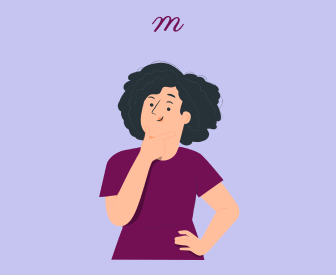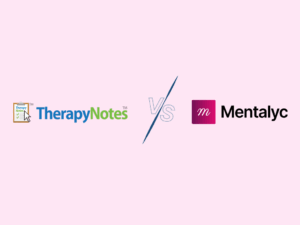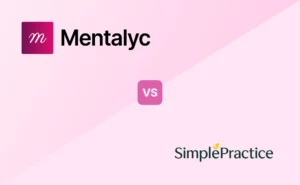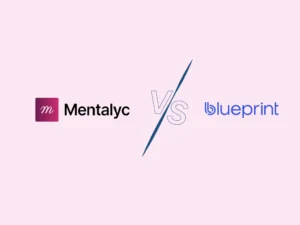You’ve probably heard about CPT codes, but how familiar are you with the nitty-gritty details? If you’re a mental health professional interested in couples and family therapy, it’s time to get up close and personal with CPT code 90847. When used correctly, this code is the key to unlocking insurance reimbursement for couples and family counseling. Stick with us; we’ll walk you through everything you need to learn to start billing 90847 today. We’ll explore the requirements around session time, reimbursement rates, modifiers, documentation, and more. We’ll answer your frequently asked questions to ensure you’re fully equipped to file claims confidently.
Let’s start here – Don’t confuse these codes!90847 signifies family group therapy sessions, while 90837 is used for individual therapy. The minimum session duration also differs: 90837 requires at least 53 minutes, whereas 90847 only needs 26 minutes. Understanding these distinctions ensures accurate billing for your therapy services.
Now let’s explore the requirements around session time, reimbursement rates, modifiers, documentation, and more. We’ll answer your frequently asked questions to ensure you’re fully equipped to file claims confidently.
Introduction to 90847
The first part of the code, “908,” represents the category of CPT psychotherapy codes, which includes codes from 90832 to 90863. The second half of each code describes the service being provided. In the case of 90847, the “47” indicates couples and family therapy.

New! Transfer your notes to EHR with a single click. No more copy-pasting.
CPT code 90847 is further defined by:
- Sessions focused on working with couples or families, with the patient present, to address relationship issues, family conflicts, and other interpersonal problems.
- Applying a relevant treatment strategy to improve family behavior and attitudes through interpersonal communication.
Understanding the Complexities of Insurance Coverage: Timeframes, Reimbursement Rates, and Billing Procedures
When providing counseling services to couples and families, it’s essential to remember that insurance coverage can vary depending on the plan. To be eligible for coverage, specific criteria must be met, including proving that the service is medically necessary to treat a diagnosis of one of the covered family members. During each session, one person must be identified as the patient with a clinical diagnosis, and their family members or partner(s) should also be present. Insurance companies usually limit couples’ counseling to one session per week or 12-20 sessions per year and may require pre-authorization before approving claims for multiple sessions using this code. It’s crucial to check with each insurance provider for their guidelines before billing.
Couples and family therapy can help improve communication skills, personal/couple growth, or parenting issues. However, it’s essential to note that sessions must have a clinical focus to be eligible for coverage. If you’ve seen the patient individually before or after the family session on the same day, you may include the modifier -59. Check with the insurance companies you bill to determine if they require any specific modifiers for couples and family therapy. Proper documentation and coding are essential to receiving reimbursement for mental health services.
To ensure proper reimbursement, it’s essential to bill for the correct code and dedicate at least 26 minutes of direct therapy in a 50-minute session, with the maximum time allowed being 80 minutes. Reimbursement rates may vary depending on the insurance plan, region, and your insurance contracts. Typically, they range between $70 to $150 per session. Medicaid and Medicare usually reimburse at a lower rate, while private insurance plans generally offer higher reimbursement for this service.
Documentation Needed for Couples and Family Therapy
Keeping accurate and comprehensive documentation, especially regarding couples or family counseling services, is imperative to maintain a thriving counseling practice. This ensures proper reimbursement for your work and helps you offer high-quality services to your clients while adhering to ethical standards.
It’s always recommended to check with each insurance carrier for specific guidelines for billing couples and family therapy, as company policies and coverage can vary. When you have any doubts, it’s best to call the insurance provider directly to verify benefits and receive clarification on any billing questions you may have.
Session Notes
For each couples and family therapy session billed under 90847, detailed session notes must be recorded and maintained in the client’s file. Keeping detailed records of each session, including the start and end times, treatment goals, interventions used, the client’s reaction or response, any homework or follow-up tasks assigned, and any progress made, will help you demonstrate the medical necessity of your services in case of an audit. Additionally, it’s vital to note the relationship of each patient to the other(s). These notes should also reflect the specific mental health issues addressed in the session and progress toward established treatment goals.
Treatment Plan
For reimbursement of couples therapy under 90847, it’s necessary to have a comprehensive treatment plan. This plan should cover the diagnoses or presenting problems, short- and long-term treatment goals, objective and measurable steps to achieve those goals, the type and frequency of services to be provided, and the expected treatment duration. Reviewing and updating the treatment plan to reflect the couple or family’s progress is essential.
Client Consent
Before beginning treatment, all couple or family participants must give written consent to disclose private information within joint counseling sessions. Consent must also be obtained to release any information to insurance companies for reimbursement.
Understanding Modifiers for CPT Code 90847
To provide more detailed information about the therapy services offered under 90847, you can utilize specific billing modifiers. These modifiers can provide valuable context that helps better document the services and ensure accurate billing.
The most common modifiers for couples and family therapy are:
-52 Reduced Services
Use -52 if you provide a shorter session than usual. For 90847, this would be less than 45 minutes. You must document the reason for the reduced time.
-53 Discontinued Procedure
Append -53 if you start a therapy session but have to end early due to circumstances outside of your control. Document the reason in your notes.
-59 Extended Services
To bill for a couples counseling session that runs longer than typical, use the -59 modifier to indicate a distinct procedural service. You must specify the additional time spent in your documentation.
Commonly Used CPT Codes for Marriage and Family Therapy
Understanding CPT codes is crucial for proper billing in marriage and family therapy. Here’s a breakdown of the most common ones:
- Individual Therapy:
- 90837 (60 minutes): Used for extended individual sessions.
- 90834 (45 minutes): Common for shorter individual sessions.
- 90832 (30 minutes): Beneficial for brief, focused sessions.
- 90832-95 (Telehealth): Designates remote therapy sessions.
- 90834-52 (Reduced Service): Used for shorter-than-standard sessions.
- Family Therapy:
- 90847 (With Patient): Employed for family sessions with the patient present.
- 90846 (Without Patient): Used for sessions with family members excluding the patient.
- Group Therapy:
- 90853: Represents group therapy sessions with multiple clients.
- Crisis Intervention:
- 90839: Applies to sessions addressing urgent emotional crises.
Conclusion
As a therapist, you can offer valuable support to couples and families who need it. By confidently following the insurance requirements, documenting your work, and adhering to time and frequency rules, you can use CPT code 90847 to bill for your services and ensure your clients receive the care they require. A robust note-taking system and a thorough description of your interventions, clients’ interactions, responses, and any clinical progress or setbacks are crucial to establishing the medical necessity for ongoing care and keeping track of your client’s progress over time. By doing so, you can ensure that your clients receive the quality counseling services they deserve while enabling you to generate reliable revenue.
Mentalyc’s progress note templates and time-saving features streamline the documentation and billing processes, freeing up more time for you to focus on delivering quality care. With the help of Mentalyc, therapists can ensure they meet insurance requirements for proper session documentation by accessing progress note templates. By signing up for Mentalyc’s free trial today, you can experience firsthand the benefits of this tool and continue doing the counseling work you love.
FAQ About CPT Code 90847 for Mental Health
What is CPT code 90847 used for?
CPT code 90847 is explicitly used for couples and family counseling when your client is present. This includes counseling for relationship issues, parenting challenges, blended family dynamics, and other family conflicts.
Who can bill CPT code 90847?
Licensed mental health professionals like therapists, counselors, social workers, and psychologists who provide couples and family therapy can bill insurance companies using CPT code 90847.
How long do the sessions need to be to bill 90847?
Sessions billed under 90847 must be at least 26 minutes long. Some insurance companies will allow two sessions in a day. The maximum amount of time billed for a single session is 50 minutes.
What is the typical reimbursement rate for 90847?
Reimbursement rates for 90847 can vary but typically fall between $75 to $150 per session, depending on your location and the insurance company. Some insurance plans offer better coverage for mental health services than others.
What documentation is required for 90847?
Proper documentation for sessions billed under 90847 includes a mental health assessment, treatment plan, progress notes for each session, and discharge summary. Notes should specify the modalities and interventions used, the client’s response, topics discussed, goals reviewed, and progress made.
Resources:
- Morales-Brown, L. (2023, May 18).What Are the Benefits of Family Counseling? Medical News Today. https://www.medicalnewstoday.com/articles/family-counseling
- Psychotherapy Services Frequently Asked Questions. (n.d.). American Psychological Association. https://www.apaservices.org/practice/reimbursement/health-codes/psychotherapy-services-faq
- Regulsky, E. (2023, July 14).Complete Psychotherapy Billing and Coding Guide 2023. BillingParadise. https://www.billingparadise.com/blog/complete-psychotherapy-billing-and-coding-guidelines/
- Solarte, C. (2023, March 20).CPT Code 90847 Demystified: A Clear and Concise Guide. MCM South. https://mcmsouth.com/cpt-code-90847-demystified/
Why other mental health professionals love Mentalyc

“It’s so quick and easy to do notes now … I used to stay late two hours to finish my notes. Now it’s a breeze.”
Licensed Professional Counselor

“It takes me less than 5 minutes to complete notes … it’s a huge time saver, a huge stress reliever.”
Licensed Marriage and Family Therapist

“By the end of the day, usually by the end of the session, I have my documentation done. I have a thorough, comprehensive note … It’s just saving me hours every week.”
CDCII

“A lot of my clients love the functionality where I can send them a summary of what we addressed during the session, and they find it very helpful and enlightening.”
Therapist






